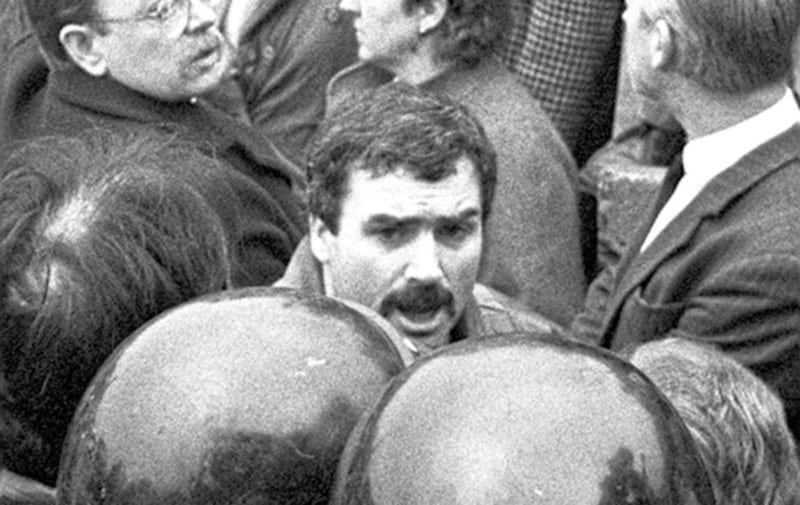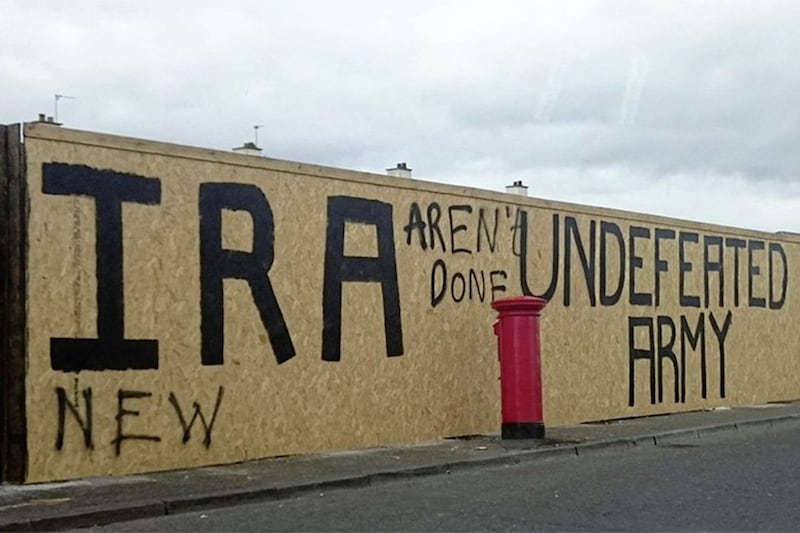An IRA unit headed by a notorious British agent vetted all operations carried out in Belfast over a three-year period in the 1980s.
The claim is made in a new book about the double life of the notorious British army agent known by the codename Stakeknife.
In 2003, Stakeknife was named as Belfast republican Freddie Scappaticci, although he denied the allegation.
It is suggested Scappaticci may have had knowledge of around 35 murders.
Estimates vary as to how many killings he was directly involved in.
After joining the IRA in the Markets area of south Belfast in the early 1970s, he rose eventually to lead its feared Internal Security Unit (ISU), also known as the Nutting Squad.
Read More
- Scappaticci believed to have died of natural causes and buried in England
- Stakeknife victims and survivors ask for information about agent's death
It is believed he joined the new unit initially as its second-in-command after it was formed in 1978.
In addition to hunting down informers, the ISU vetted new recruits, debriefed IRA members after arrest and investigated operations gone wrong.

Stakeknife's Dirty War', by former republican prisoner Richard O'Rawe, explores efforts by British intelligence to infiltrate the IRA.
It is suggested that Scappaticci's ISU vetted every IRA operation in Belfast between 1986 - 1989.
Mr O'Rawe also explores the role of a shadowy intelligence oversight bodies known as Tasking and Co-ordinating Groups (TCGs).
They oversaw covert operations on behalf of British intelligence agencies.
Led by RUC Special Branch, TCGs included MI5 and elements of the British army - including the Force Research Unit.
Formed in May 1978, the role of TCGs was to ensure closer co-operation and to make sure all intelligence was properly handled.
The involvement of FRU, which was responsible for handling Scappaticci, means TCGs were aware of the intelligence Scappaticci was providing.
As a member of, and subsequent 'Officer Commanding' the ISU, Scappaticci was involved in interrogating dozens of suspected informers.
It is suggested in Mr O'Rawe's book that Scappaticci passed on details of interrogations to his FRU handlers and they in turn would have informed the relevant TCG.
It is suggested that the TCGs were aware of other IRA activities.
Mr O'Rawe contends that a decision by the IRA's 'Army Council' in 1986 to allow its Northern Command to vet all its operations was critical.
The author recounts that ex-Belfast commander Gerry 'Whitey' Bradley was "enraged" that all IRA operations in the city were being vetted by the ISU.
Mr O'Rawe recounts how Bradley later wrote in his own book, Insider, that "by requiring all Belfast operations to be vetted by Internal Security, the OC was unwittingly providing British intelligence with knowledge of all IRA plans in Belfast".
Other republicans from the era agree with Mr Bradley's assessment.
A former victim of the ISU, Paddy McDade, revealed details of how he was interrogated by the ISU in Co Roscommon in 1986 after being brought to the location by someone who later turned out to be an informer.
McDade was one of a fortunate few who lived to recall his experience at the hands of the ISU.
He revealed how he was stripped naked and tied up "like a turkey" before his head and face were stamped on.
Cigarettes were also stubbed out on his ankles.
Mr McDade also agreed with Mr Bradley's assertion that Scappaticci "effectively vetoed all operations in Belfast from 1986 to January 1989".
"Every major op had to go through Northern Command, and the security team were an extension of Northern Command, and Scap was in charge of the security team," he told the author.
An IRA member interviewed for the book earlier this year recounted a conversation he had with journalist Jack Holland about former senior RUC man Ian Phoenix, who was killed in 1994 when a Chinook helicopter carrying British intelligence experts crashed on the Mull of Kintyre.
"Jack Holland read through the notes of Ian Phoenix and told me that a senior IRA figure close to all key figures in Belfast was reporting regularly to him on operations," he said.
"Holland said the information was so serious that it was impossible for the IRA to conduct a war."
The author also recounts how in a newspaper interview two decades ago, a former FRU member confirmed lives were lost to protect Scappaticci.
"Bad things happened, and people died, but Scap saved lives as well," the FRU member said.
"Decisions which led to loss of life to protect Stakeknife were taken by the Joint Irish Section – MI5 in Belfast and the Tasking and Co-ordinating Group, which consisted of the heads of Special Branch, MI5, British army command and the ministry of defence and other government officials."
In 2016 OpStakeknife's Dirty War by Richard O'Rawe is published by Merrion Press. Kenova was set up to investigate the activities of Stakeknife and is headed by former Befordshire Police Chief Constable Jon Boutcher.
A report of the investigation's findings is expected to be released in the near future.
It was claimed in April that the notorious British agent had died.
However, details of his death, including cause and location, have not been made public.








